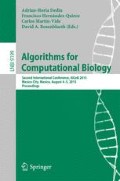Abstract
The amount of completely sequenced chloroplast genomes increases rapidly every day, leading to the possibility to build large scale phylogenetic trees of plant species. Considering a subset of close plant species defined according to their chloroplasts, the phylogenetic tree that can be inferred by their core genes is not necessarily well supported, due to the possible occurrence of “problematic” genes (i.e., homoplasy, incomplete lineage sorting, horizontal gene transfers, etc.) which may blur phylogenetic signal. However, a trustworthy phylogenetic tree can still be obtained if the number of problematic genes is low, the problem being to determine the largest subset of core genes that produces the best supported tree. To discard problematic genes and due to the overwhelming number of possible combinations, we propose an hybrid approach that embeds both genetic algorithms and statistical tests. Given a set of organisms, the result is a pipeline of many stages for the production of well supported phylogenetic trees. The proposal has been applied to different cases of plant families, leading to encouraging results for these families.
Access this chapter
Tax calculation will be finalised at checkout
Purchases are for personal use only
References
Alkindy, B., Couchot, J.F., Guyeux, C., Mouly, A., Salomon, M., Bahi, J.M.: Finding the core-genes of chloroplasts. J. Biosci. Biochem. Bioinform. 4(5), 357–364 (2014)
Alkindy, B., Guyeux, C., Couchot, J.-F., Salomon, M., Bahi, J.M.: Gene similarity-based approaches for determining core-genes of chloroplasts. In: 2014 IEEE International Conference on Bioinformatics and Biomedicine (BIBM), pp. 71–74. IEEE (2014)
Bhandari, D., Murthy, C., Pal, S.K.: Genetic algorithm with elitist model and its convergence. Int. J. Pattern Recogn. Artif. Intell. 10(06), 731–747 (1996)
Booker, L.B., Goldberg, D.E., Holland, J.H.: Classifier systems and genetic algorithms. Artif. Intell. 40(1), 235–282 (1989)
Edgar, R.C.: Muscle: multiple sequence alignment with high accuracy and high throughput. Nucleic Acids Res. 32(5), 1792–1797 (2004)
Goldberg, D.E.: Genetic Algorithms in Search, Optimization and Machine Learning. Addison-Wesley, Reading (1993)
Gupta, M., Singh, S.: A novel genetic algorithm based approach for optimization of distance matrix for phylogenetic tree construction. Int. J. Comput. Appl. 52(9), 14–18 (2012)
Holland, J.H.: Adaptation in Natural and Artificial Systems. University of Michigan Press, Ann Arbor (1975)
Holland, J.H.: Adaptation in Natural and Artificial Systems, 2nd edn. MIT Press, Cambridge (1992)
Matsuda, H.: Construction of phylogenetic trees from amino acid sequences using a genetic algorithm. In: Proceedings of Genome Informatics Workshop, vol. 6, pp. 19–28 (1995)
Palmer, J.D.: Plastid chromosomes: structure and evolution. Mol. Biol. Plastids 7, 5–53 (1991)
Prebys, E.K.: The genetic algorithm in computer science. MIT Undergrad. J. Math 2007, 165–170 (2007)
Stamatakis, A., Ludwig, T., Meier, H.: Raxml-iii: a fast program for maximum likelihood-based inference of large phylogenetic trees. Bioinformatics 21(4), 456–463 (2005)
Tate, S.I., Yoshihara, I., Yamamori, K., Yasunaga, M.: A parallel hybrid genetic algorithm for multiple protein sequence alignment. In: Proceedings of the World on Congress on Computational Intelligence, vol. 1, pp. 309–314. IEEE (2002)
Tibshirani, R.: Regression shrinkage and selection via the lasso. J. Roy. Stat. Soc. (Ser. B) 58, 267–288 (1996)
Wyman, S.K., Jansen, R.K., Boore, J.L.: Automatic annotation of organellar genomes with dogma. Bioinformatics 20(17), 3252–3255 (2004). Oxford Press
Acknowledgement
Computations have been performed on the supercomputer facilities of the Mésocentre de calcul de Franche-Comté.
Author information
Authors and Affiliations
Corresponding author
Editor information
Editors and Affiliations
Rights and permissions
Copyright information
© 2015 Springer International Publishing Switzerland
About this paper
Cite this paper
AlKindy, B., Guyeux, C., Couchot, JF., Salomon, M., Parisod, C., Bahi, J.M. (2015). Hybrid Genetic Algorithm and Lasso Test Approach for Inferring Well Supported Phylogenetic Trees Based on Subsets of Chloroplastic Core Genes. In: Dediu, AH., Hernández-Quiroz, F., Martín-Vide, C., Rosenblueth, D. (eds) Algorithms for Computational Biology. AlCoB 2015. Lecture Notes in Computer Science(), vol 9199. Springer, Cham. https://doi.org/10.1007/978-3-319-21233-3_7
Download citation
DOI: https://doi.org/10.1007/978-3-319-21233-3_7
Published:
Publisher Name: Springer, Cham
Print ISBN: 978-3-319-21232-6
Online ISBN: 978-3-319-21233-3
eBook Packages: Computer ScienceComputer Science (R0)

